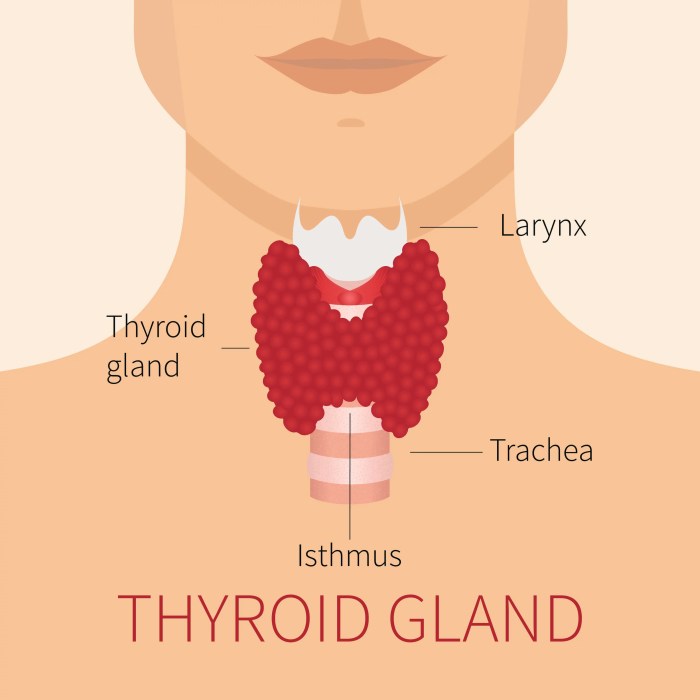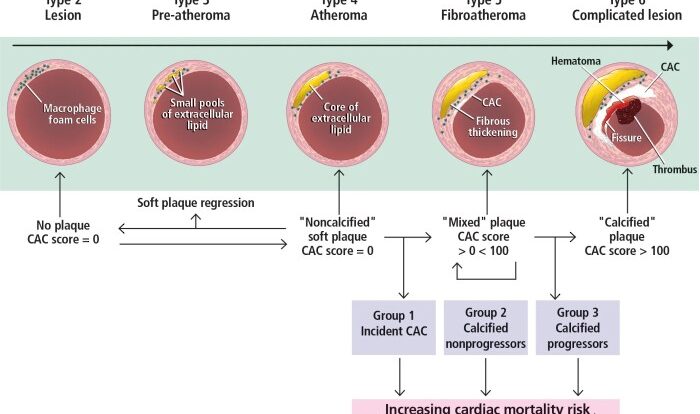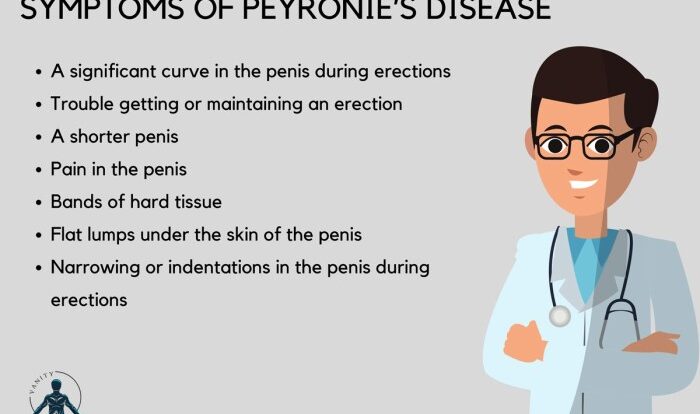Can i go to urgent care for thyroid problems – When it comes to thyroid problems, urgent care can be a viable option. This article delves into the circumstances where urgent care is appropriate for thyroid-related issues, the signs and symptoms that warrant immediate medical attention, and the diagnostic and treatment options available at urgent care facilities.
Overview of Thyroid Problems
The thyroid gland, a small butterfly-shaped gland located in the neck, plays a crucial role in regulating metabolism, growth, and development. Thyroid problems occur when the thyroid gland produces too much or too little thyroid hormone.
Common Thyroid Disorders
Common thyroid disorders include:
- Hyperthyroidism:Occurs when the thyroid gland produces too much thyroid hormone.
- Hypothyroidism:Occurs when the thyroid gland does not produce enough thyroid hormone.
Symptoms of Thyroid Disorders
The symptoms of thyroid disorders can vary depending on the type of disorder. Here’s a table summarizing the common symptoms of hyperthyroidism and hypothyroidism:
| Symptom | Hyperthyroidism | Hypothyroidism |
|---|---|---|
| Weight changes | Unintentional weight loss | Unintentional weight gain |
| Heart rate | Rapid or irregular heartbeat | Slow or weak heartbeat |
| Energy levels | Increased energy levels | Fatigue and weakness |
| Body temperature | Feeling hot or sweaty | Feeling cold or intolerant to cold |
| Skin and hair | Thinning skin, brittle hair | Dry skin, coarse hair |
| Mood and cognition | Anxiety, irritability, difficulty concentrating | Depression, apathy, difficulty concentrating |
Urgent Care for Thyroid Problems
In most cases, thyroid issues can be managed with routine medical care. However, there are certain situations when seeking urgent medical attention is crucial. Understanding the signs and symptoms that warrant immediate medical intervention can help ensure timely treatment and prevent complications.
Signs and Symptoms Requiring Urgent Care
- Severe neck pain or swelling:Intense pain or swelling in the neck, especially if accompanied by difficulty breathing or swallowing, could indicate a thyroid storm, a life-threatening condition.
- Difficulty breathing:Hoarseness, wheezing, or shortness of breath may occur if the thyroid gland is enlarged and compressing the airway.
- Rapid or irregular heartbeat:A rapid or irregular heartbeat can be a sign of hyperthyroidism, an overactive thyroid gland.
- Extreme fatigue or weakness:Fatigue that is severe or persistent, accompanied by muscle weakness, may indicate hypothyroidism, an underactive thyroid gland.
- Changes in mental status:Confusion, disorientation, or other mental changes may occur with thyroid problems, especially in older adults.
- Fever or chills:A fever or chills, especially if accompanied by other thyroid symptoms, may indicate an infection or inflammation of the thyroid gland.
Diagnosis and Treatment at Urgent Care
At urgent care facilities, healthcare professionals can perform diagnostic tests to assess thyroid problems. These tests may include:
Physical Exam
- Checking the thyroid gland for size, shape, and any nodules or lumps.
- Examining the neck for any swelling or tenderness.
Blood Tests
- Measuring thyroid hormone levels (T3, T4, TSH).
- Checking for thyroid antibodies, such as anti-TPO and anti-TG.
Imaging Tests, Can i go to urgent care for thyroid problems
- Ultrasound to visualize the thyroid gland and identify any abnormalities.
- Thyroid scan to assess the function and activity of the thyroid gland.
Based on the diagnostic results, urgent care providers may recommend treatment options, which may include:
Medications
- Thyroid hormone replacement therapy for hypothyroidism.
- Anti-thyroid medications for hyperthyroidism.
Referrals
- To an endocrinologist for further evaluation and management.
- To a surgeon if surgery is necessary to remove a thyroid nodule or enlarged gland.
Follow-Up Care
After visiting urgent care for thyroid problems, follow-up care is crucial for monitoring your condition and ensuring proper treatment.
Your urgent care provider may recommend scheduling an appointment with an endocrinologist, a specialist in hormone disorders including thyroid problems.
Scheduling an Appointment with an Endocrinologist
To schedule an appointment with an endocrinologist, you can:
- Ask your urgent care provider for a referral.
- Contact your insurance company to find endocrinologists in your area.
- Search online for endocrinologists in your area.
Prevention and Management
Proactively addressing thyroid health is crucial to prevent potential problems and maintain optimal well-being. Implementing certain lifestyle modifications and adhering to regular thyroid check-ups can significantly contribute to thyroid health management.
Adopting a balanced diet rich in essential nutrients, maintaining a healthy weight, and engaging in regular exercise are key lifestyle changes that can positively impact thyroid function.
If you’re wondering whether you can go to urgent care for thyroid problems, the answer is generally yes. Urgent care centers can diagnose and treat a wide range of thyroid issues, including hyperthyroidism, hypothyroidism, and thyroid nodules. However, if you’re experiencing severe symptoms such as difficulty breathing or swallowing, it’s best to go to the emergency room.
If you’re pregnant , you should also go to the emergency room to confirm your pregnancy and rule out any complications.
Regular Thyroid Check-ups
Regular thyroid check-ups play a vital role in early detection and prompt intervention for thyroid-related issues. These check-ups involve a physical examination, blood tests to measure thyroid hormone levels, and possibly additional tests such as thyroid ultrasound or radioactive iodine uptake.
Individuals with a family history of thyroid problems, those experiencing symptoms suggestive of thyroid dysfunction, or those taking medications that can affect thyroid function should consider more frequent thyroid check-ups as recommended by their healthcare provider.
Common Misconceptions about Thyroid Problems
Thyroid disorders are common health issues, but many misconceptions and myths surround them. It’s essential to separate facts from fiction to make informed decisions about your health.
Myth 1: Thyroid problems only affect women.
While women are more likely to develop thyroid issues, men can also be affected. Thyroid disorders can occur in people of all ages, genders, and backgrounds.
While you’re pondering the complexities of thyroid problems and whether urgent care is the right destination for your concerns, have you ever wondered how old you have to be to get laser hair removal ? It’s a question that’s often on the minds of those seeking a more permanent solution to unwanted body hair.
But don’t let that sidetrack you from your primary concern. Urgent care remains a viable option for addressing thyroid-related issues that require prompt attention.
Myth 2: All thyroid problems are serious.
While some thyroid disorders can be severe, many are manageable with proper treatment. Most thyroid problems do not pose immediate health risks and can be effectively controlled with medication or lifestyle changes.
Myth 3: Thyroid problems are caused by a lack of iodine.
Iodine deficiency is a common cause of thyroid disorders in some regions of the world. However, in countries where iodized salt is widely used, iodine deficiency is less common as a cause of thyroid problems.
Myth 4: Thyroid medication is addictive.
Thyroid medications, such as levothyroxine, are not addictive. They are used to replace or supplement the thyroid hormones that the body is unable to produce on its own. These medications are typically taken long-term to manage thyroid disorders.
Myth 5: Thyroid problems always cause weight gain or loss.
While thyroid disorders can affect metabolism and weight, they do not always lead to weight gain or loss. Some thyroid problems can cause weight changes, while others may not have a significant impact on weight.
Resources for Thyroid Support

Navigating thyroid problems can be challenging, but support is available to help you manage your condition and improve your well-being.
Numerous support groups, online forums, and other resources cater specifically to individuals with thyroid issues. These platforms provide a sense of community, where you can connect with others who understand your experiences and share valuable insights.
Support Groups
- American Thyroid Association (ATA): ATA offers support groups in various regions across the United States, providing a forum for members to share information, offer support, and advocate for thyroid health.
- Thyroid Foundation of America (TFA): TFA hosts online support groups where individuals can connect with others who have thyroid conditions, discuss their experiences, and learn about the latest medical advancements.
Online Forums
- Thyroid Community: This online forum provides a platform for individuals with thyroid problems to connect, ask questions, and share their experiences with others who understand their challenges.
- Inspire: Inspire is a health-focused social network where individuals with thyroid conditions can connect with others, share their stories, and find support from those who have similar experiences.
Other Resources
- Thyroid Wiki: This comprehensive online resource provides up-to-date information on thyroid disorders, treatment options, and patient experiences.
- Thyroid.org: Thyroid.org offers a wealth of resources, including patient education materials, clinical guidelines, and information on thyroid research and advocacy.
Thyroid Problem Statistics
Thyroid disorders are prevalent worldwide, affecting a significant portion of the population. The exact prevalence varies depending on the geographic region and the diagnostic criteria used, but studies suggest that thyroid problems affect around 5-10% of the global population.
I was wondering if I could go to urgent care for thyroid problems, but then I remembered that I also wanted to ask about laser hair removal on my head. Can you do laser hair removal on your head ? I’m not sure if it’s possible, but I’d love to know more about it.
Anyway, back to my thyroid problems, I’m still not sure if I should go to urgent care or not.
In the United States, approximately 20 million people have some form of thyroid disease, with women being more commonly affected than men. Hypothyroidism, or underactive thyroid, is the most common type of thyroid disorder, accounting for about 90% of cases.
Impact on Overall Health and Well-being
Thyroid problems can have a wide range of effects on overall health and well-being. Untreated thyroid disorders can lead to various health issues, including:
- Weight gain or loss
- Changes in mood and energy levels
- Reproductive problems
- Heart disease
- Bone loss
- Skin and hair problems
- Cognitive impairment
Proper diagnosis and treatment of thyroid problems are crucial to prevent or manage these potential health complications.
Thyroid and Pregnancy
Thyroid health is paramount during pregnancy as it directly affects both the mother and the developing fetus. Proper thyroid function is essential for fetal growth, development, and neurological function.
Thyroid problems during pregnancy can lead to various risks and complications:
Maternal Risks
- Preeclampsia (high blood pressure during pregnancy)
- Gestational diabetes
- Preterm birth
- Low birth weight
- Postpartum hemorrhage
Fetal Risks
- Congenital hypothyroidism (underactive thyroid in newborns)
- Intellectual disabilities
- Growth retardation
- Neurological damage
Thyroid and Children

Thyroid problems can also affect children, although they are less common than in adults. The thyroid gland is responsible for producing hormones that regulate growth and development, so thyroid problems can have a significant impact on a child’s health.
There are two main types of thyroid problems that can occur in children: hypothyroidism and hyperthyroidism.
Hypothyroidism
Hypothyroidism is a condition in which the thyroid gland does not produce enough thyroid hormone. This can lead to a number of symptoms, including:
- Slowed growth
- Delayed puberty
- Constipation
- Fatigue
- Cold intolerance
- Dry skin
- Brittle hair
- Weight gain
- Poor appetite
Hyperthyroidism
Hyperthyroidism is a condition in which the thyroid gland produces too much thyroid hormone. This can lead to a number of symptoms, including:
- Rapid growth
- Early puberty
- Diarrhea
- Weight loss
- Heat intolerance
- Sweating
- Nervousness
- Anxiety
- Insomnia
Thyroid and the Elderly: Can I Go To Urgent Care For Thyroid Problems

As we age, our thyroid function undergoes certain changes. These changes can affect the way our bodies produce and use thyroid hormones.
One of the most common age-related changes in thyroid function is a decrease in the production of thyroid hormones. This is known as hypothyroidism. Hypothyroidism can cause a variety of symptoms, including fatigue, weight gain, constipation, and depression.
Another common age-related change in thyroid function is the development of thyroid nodules. Thyroid nodules are growths that form on the thyroid gland. Most thyroid nodules are benign, but some can be cancerous.
Symptoms of Thyroid Problems in the Elderly
The symptoms of thyroid problems in the elderly can be similar to the symptoms of other conditions, such as aging. This can make it difficult to diagnose thyroid problems in the elderly.
Some of the most common symptoms of thyroid problems in the elderly include:
- Fatigue
- Weight gain
- Constipation
- Depression
- Muscle weakness
- Dry skin
- Brittle hair
- Hoarseness
- Slow heart rate
- Cold intolerance
Final Thoughts
Understanding the role of urgent care in managing thyroid problems can help individuals make informed decisions about their healthcare. By recognizing the appropriate time to seek urgent care, individuals can ensure timely intervention and appropriate treatment for their thyroid conditions.
Q&A
What are the common symptoms of thyroid problems?
Symptoms can vary depending on the type of thyroid disorder, but may include fatigue, weight changes, changes in appetite, mood swings, and menstrual irregularities.
When should I seek urgent care for thyroid problems?
Urgent care is appropriate when experiencing severe symptoms such as difficulty breathing, rapid or irregular heartbeat, extreme anxiety, or sudden onset of swelling in the neck.
What diagnostic tests are performed at urgent care for thyroid problems?
Urgent care facilities typically perform blood tests to measure thyroid hormone levels and rule out other potential causes of symptoms.
What treatment options are available at urgent care for thyroid problems?
Urgent care can provide temporary relief from symptoms through medications such as beta-blockers for rapid heartbeat or anti-anxiety medications for extreme anxiety. However, ongoing management and treatment typically require referral to an endocrinologist.





